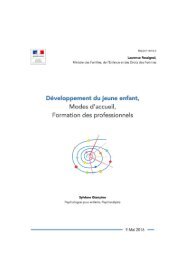agrl_innovations_in_ssa.pdf?utm_content=buffercb41d&utm_medium=social&utm_source=twitter
agrl_innovations_in_ssa.pdf?utm_content=buffercb41d&utm_medium=social&utm_source=twitter
agrl_innovations_in_ssa.pdf?utm_content=buffercb41d&utm_medium=social&utm_source=twitter
Create successful ePaper yourself
Turn your PDF publications into a flip-book with our unique Google optimized e-Paper software.
cooperation, builds trust, and establishes a common vision for the future. Creation of this<br />
vision needs to have been built on an assessment of the challenges and realistic opportunities<br />
for improvement along a value cha<strong>in</strong>. Most important was the establishment and participation<br />
of effective and representative farmer organisations that communicate with members. In many<br />
cases this required support and capacity development. A facilitation process that encourages<br />
dialogue, identifies and prioritises opportunities, encourages jo<strong>in</strong>t plann<strong>in</strong>g with agreement on<br />
partner roles and implementation responsibilities played an important role.<br />
Improved <strong>in</strong>frastructure, particularly roads, communication and power clearly provide the<br />
basis for ensur<strong>in</strong>g <strong>in</strong>puts can be made available at affordable prices and outputs delivered to<br />
market. This was often a precursor <strong>in</strong> seek<strong>in</strong>g opportunity to add value along market cha<strong>in</strong>s.<br />
Facilitation was frequently nece<strong>ssa</strong>ry to promote collaborative learn<strong>in</strong>g and assessment<br />
processes. This requires not only the nece<strong>ssa</strong>ry skills, but also the enthusiasm and determ<strong>in</strong>ation<br />
to ensure that key actors cont<strong>in</strong>ued to participate and play their roles. This can be a difficult<br />
task, requir<strong>in</strong>g the support of policy and decision makers. Although research can be an<br />
important component, it is often not the central one, and <strong>in</strong> the early stages <strong>in</strong>terventions<br />
to build capacity, access and use exist<strong>in</strong>g knowledge and foster learn<strong>in</strong>g are required. Clearly<br />
ready and timely access to <strong>in</strong>puts <strong>in</strong>clud<strong>in</strong>g f<strong>in</strong>ance is crucial. This needs to be based on<br />
effective and competitive market<strong>in</strong>g, whether for domestic or export markets, with social and<br />
environmental concerns be<strong>in</strong>g addressed.<br />
Ultimately local participants build susta<strong>in</strong>ability on ownership with effective back-up research<br />
and development organisation <strong>in</strong> both the private and public sectors. Of the 21 case studies<br />
all had succeeded to a greater or lesser extent, although there were elements that needed to<br />
be addressed or re<strong>in</strong>forced to ensure long-term susta<strong>in</strong>ability. Of the 21 case studies, 11 had<br />
reached the susta<strong>in</strong>ability phase, while 10 were still address<strong>in</strong>g ownership by local participants.<br />
A comparative analysis of the case studies 99






